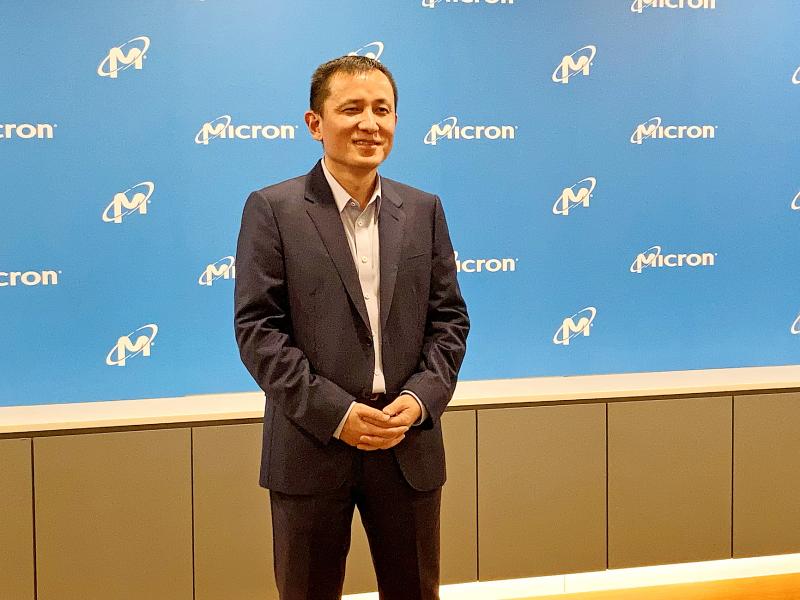US memorychip maker Micron Technology Inc yesterday said it plans to add about 2,000 employees to its Taiwanese operations within the next two to three years, as it seeks to ramp up some of the most advanced DRAM manufacturing technologies, including its 1-gamma nanometer node DRAM process in 2024.
The hiring would result in a 20 percent expansion of its Taiwan staff, which currently comprises about 10,000 workers.
The hiring drive would make Micron the largest foreign employer in Taiwan, corporate vice president and new head of Micron Taiwan Donghui Lu (盧東暉) told a news conference in Taichung.

Photo: Lisa Wang, Taipei Times.
Unveiling the company’s technology road map, Lu said one of his priorities is to accelerate tech deployment in Taiwan, including ramping up 1-beta nanometer node DRAM production by the end of this year and 1-gamma nanometer node DRAM in 2024.
The two processes would be the most advanced DRAM technologies when they enter mass production, Lu said.
To facilitate the 1-gamma nanometer node process, the chipmaker plans to create a “research and development corridor” and a research team dedicated for the technology at Micron’s new Taichung fab, A3, using extreme-ultraviolet (EUV) tools, Lu said.
Micron has started construction of A3 in 2019 and is installing manufacturing equipment in preparation for mass production.
Micron believes it is the right time to introduce EUV for the production of 1-gamma nanometer technology, as Taiwan Semiconductor Manufacturing Co (TSMC, 台積電), Samsung Electronics Co and Intel Corp have adopted the tools over the past few years, leading to better equipment availability and a mature ecosystem, Lu said.
“That will allow us to have the best combination of cost, technology and performance,” Lu said.
Micron plans to adopt the EUV tools for the next three generations of DRAM processes including 1-gamma, 1-delta and 1-epilson technologies, to make a better return from the investment in EUV equipment, he said.
In addition, accelerating its pace in growing the local semiconductor industry, EUV supply chains is also one of Lu’s priorities by increasing adoption of local manufacturing equipment and materials, he said.
A comprehensive supply chain can help shorten production cycles and improve cost efficiency, especially as transportation costs skyrocketed during the COVID-19 pandemic, he added.
“Taiwan has built the most extensive EUV ecosystem. No other place in the world can compare,” he said.
Commenting on the industry’s recent weakness amid geopolitical tensions and the pandemic, Lu said it might see short-term supply-demand imbalance, but Micron is bullish about the industry’s long-term outlook, as accelerating digitalization worldwide is driving demand for memory chips.
Micron plans to focus on rapidly growing markets, including the automotive electronics, industrial devices and data centers, to deliver stable gross margin, Lu said.

NEW IDENTITY: Known for its software, India has expanded into hardware, with its semiconductor industry growing from US$38bn in 2023 to US$45bn to US$50bn India on Saturday inaugurated its first semiconductor assembly and test facility, a milestone in the government’s push to reduce dependence on foreign chipmakers and stake a claim in a sector dominated by China. Indian Prime Minister Narendra Modi opened US firm Micron Technology Inc’s semiconductor assembly, test and packaging unit in his home state of Gujarat, hailing the “dawn of a new era” for India’s technology ambitions. “When young Indians look back in the future, they will see this decade as the turning point in our tech future,” Modi told the event, which was broadcast on his YouTube channel. The plant would convert

‘SEISMIC SHIFT’: The researcher forecast there would be about 1.1 billion mobile shipments this year, down from 1.26 billion the prior year and erasing years of gains The global smartphone market is expected to contract 12.9 percent this year due to the unprecedented memorychip shortage, marking “a crisis like no other,” researcher International Data Corp (IDC) said. The new forecast, a dramatic revision down from earlier estimates, gives the latest accounting of the ongoing memory crunch that is affecting every corner of the electronics industry. The demand for advanced memory to power artificial intelligence (AI) tasks has drained global supply until well into next year and jeopardizes the business model of many smartphone makers. IDC forecast about 1.1 billion mobile shipments this year, down from 1.26 billion the prior

People stand in a Pokemon store in Tokyo on Thursday. One of the world highest-grossing franchises is celebrated its 30th anniversary yesterday.

Zimbabwe’s ban on raw lithium exports is forcing Chinese miners to rethink their strategy, speeding up plans to process the metal locally instead of shipping it to China’s vast rechargeable battery industry. The country is Africa’s largest lithium producer and has one of the world’s largest reserves, according to the US Geological Survey (USGS). Zimbabwe already banned the export of lithium ore in 2022 and last year announced it would halt exports of lithium concentrates from January next year. However, on Wednesday it imposed the ban with immediate effect, leaving unclear what the lithium mining sector would do in the